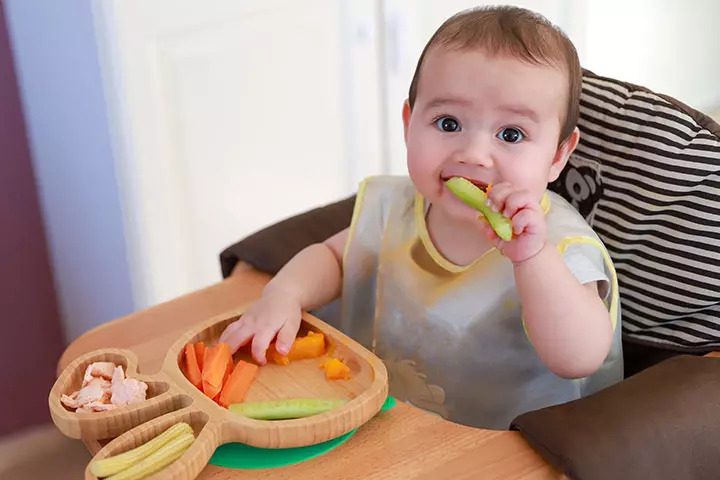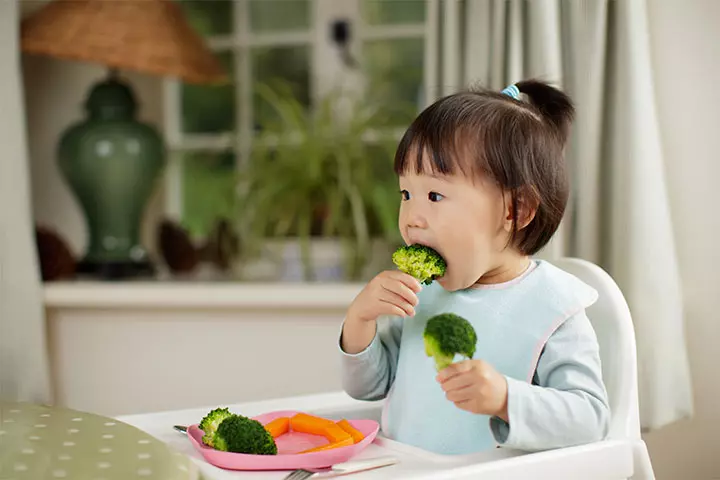
Image: Shutterstock
Being a parent means navigating the maze of snack choices for your little one. Toddlerhood is a time of exploration, growth, and curious taste buds. Finding the right snacks that are not just tasty but also healthy can be a bit of a juggle. Let’s take a stroll through the world of toddler snacks, exploring what’s healthy, what’s not, and some delicious alternatives that’ll keep your toddler’s tummy happy. Read on to know more!
What’s Healthy For Toddler Snacks?
Image: Shutterstock
1. Packed With Nutrients
Healthy snacks for toddlers are like tiny packages of goodness. They contain essential nutrients like vitamins, minerals, and fiber to support their growth and development.
2. Low In Added Sugar
It’s like a sweet secret — keeping added sugar in check. Excessive sugar can lead to energy spikes and crashes, affecting their mood and health.
3. Rich In Whole Foods
Opting for snacks made from whole foods like fruits, vegetables, whole grains, and lean proteins ensures they get a variety of nutrients.
Wholesome Snacks For Your Toddler
Fruit Medley
Image: Shutterstock
1. Nutrient Powerhouse
Fresh fruits like bananas, berries, apple slices, or mandarin oranges are packed with vitamins, minerals, and antioxidants. They provide a natural sweetness that appeals to toddlers’ taste buds.
2. Vitamin Bounty
Each fruit brings a unique blend of vitamins. For instance, bananas offer potassium, berries provide antioxidants, and apples offer fiber — all essential for their growth and development.
3. Easy To Handle
These fruits are toddler-friendly, easy to hold, and usually don’t require much preparation, making them convenient and fuss-free snacks.
Veggie Sticks
Image: Shutterstock
1. Colorful Crunch
Carrot sticks, cucumber slices, and bell pepper strips offer a burst of colors and flavors. They are rich in vitamins and fiber, supporting your toddler’s overall health.
2. Dip For Fun
Pairing these veggies with a tasty dip, like hummus or yogurt-based dressings, adds an element of fun and encourages your kid to enjoy them even more.
3. Texture Exploration
The crunchy texture of these veggies provides a sensory experience, aiding in their oral development and introducing them to various textures.
Whole Grain Delights
Image: Shutterstock
1. Nutrient-Dense
Snacks made from whole grains, such as whole-grain crackers, cereal, or toast, are a powerhouse of nutrients. They offer fiber, vitamins, and minerals that are crucial for your toddler’s energy and growth.
2. Slow Release Of Energy
Whole grains provide a steady release of energy, keeping your toddler fueled and active throughout the day without the quick energy spike and crash.
3. Versatile Options
These snacks come in various forms, making them versatile for different tastes and preferences, ensuring there’s something for every little eater.
Dairy Goodness
Image: Shutterstock
1. Calcium And Protein Source
Yogurt, cheese cubes, and milk are excellent sources of calcium and protein, essential for your toddler’s bone and muscle development.
2. Gut Health Support
Yogurt contains probiotics that support a healthy gut, aiding digestion and boosting their immune system.
3. Variety Of Options
With a range of dairy options available, you can choose from low-sugar or unsweetened varieties to ensure a healthier choice for your little one.
Homemade Treats
Image: Shutterstock
1. Customizable Recipes
Homemade snacks like mini muffins made with whole-wheat flour and fruit or homemade trail mix with nuts, seeds, and dried fruits allow you to control the ingredients, ensuring a nutritious and tasty snack.
2. Added Nutritional Value
By incorporating whole grains, fruits, nuts, and seeds, homemade treats offer a blend of nutrients, supporting your toddler’s overall health and providing energy for their active days.
Snacks To Avoid
Image: Shutterstock
1. Excessively Sugary Treats
Keep an eye out for snacks with high added sugar content like candies, sugary drinks, or heavily sweetened snacks. They can lead to cavities and unhealthy eating habits.
2. Highly Processed Foods
Steer clear of heavily processed snacks with artificial flavors, colors, or excessive salt. These may lack nutrients and have added unhealthy ingredients.
3. Choking Hazards
Avoid snacks that pose a choking risk, like whole nuts, popcorn, or hard candies. Opt for age-appropriate sizes and textures to ensure safe munching.
4. Unhealthy Fats
Snacks high in unhealthy fats, such as fried chips or snacks made with trans fats, aren’t ideal for your toddler’s health.
Crafting Healthy Snack Time
Image: Shutterstock
1. Variety Is The Spice
Keep snack time exciting by offering a variety of healthy options. This not only exposes them to different tastes but also ensures they get a wide range of nutrients.
2. Portion Control
Tiny tummies don’t need huge portions. Offer snacks in appropriate portion sizes to prevent overeating and ensure they have room for nutritious meals.
3. Lead By Example
Your eating habits influence your toddler’s choices. Snack on healthy options yourself, setting a positive example they’ll follow.
Navigating your toddler’s snack choices may feel like tip-toeing through a snacking minefield, but armed with the knowledge of what’s healthy and what’s not, you’re equipped to make wise choices. Opt for nutrient-packed, low-sugar snacks made from whole foods, and avoid overly processed, sugary, and choking hazard snacks. Keep snack time fun, nutritious, and a delightful journey of exploring tastes and textures for your curious little eater.




















